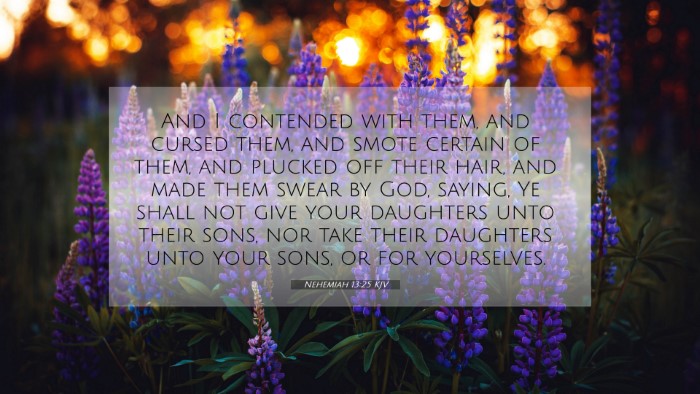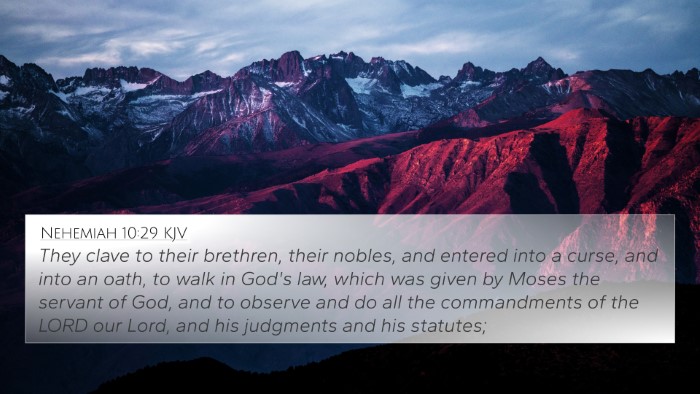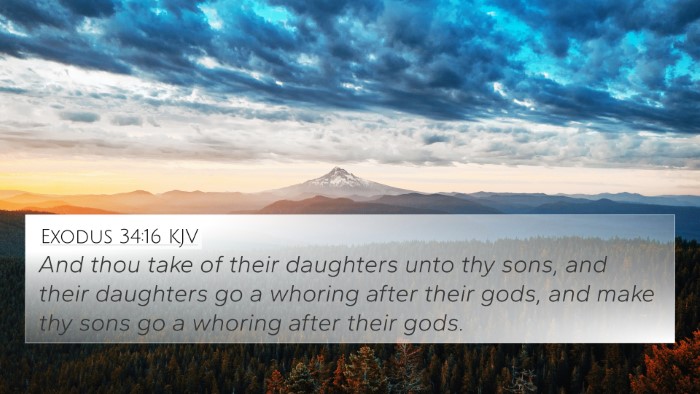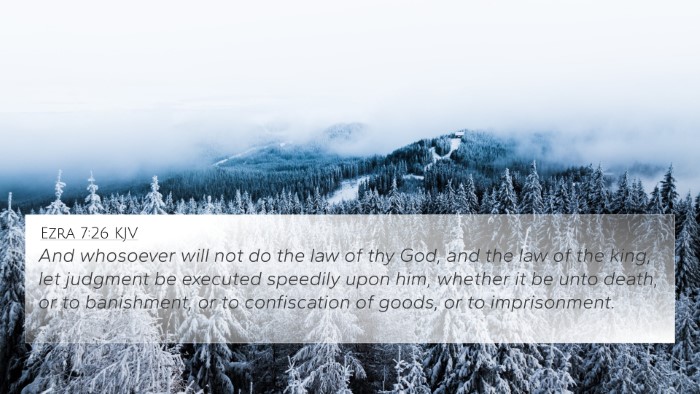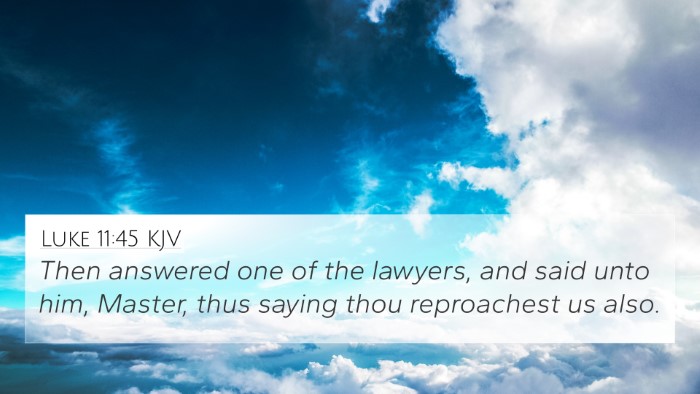Understanding Nehemiah 13:25
Nehemiah 13:25 states: "And I contended with them, and cursed them, and smote certain of them, and plucked off their hair, and made them swear by God, saying, Ye shall not give your daughters unto their sons, nor take their daughters unto your sons, or for yourselves."
Summary of the Verse
This passage presents Nehemiah exercising strong leadership and authority in response to a serious violation of the covenant with God. The context involves intermarriage with foreign nations, which was seen as a threat to the purity of the Hebrew community and its adherence to God's commandments.
Interpretation from Public Domain Commentaries
Matthew Henry's Commentary
Matthew Henry notes that Nehemiah's actions were indicative of his zeal for God's law and his commitment to maintaining the sanctity of the people of Israel. His fierce reprimand, including physical actions such as pulling hair, underscores the gravity of the situation. Henry emphasizes that Nehemiah's intent was to preserve the integrity of the nation and keep them from sin.
Albert Barnes' Commentary
Albert Barnes elaborates that Nehemiah's confrontational approach highlights a leader's responsibility to uphold community standards and deter wrongdoing. Barnes contends that the way Nehemiah invoked God's name when addressing the issue reflects a deep sense of spiritual urgency and the importance of covenant fidelity among the Israelites.
Adam Clarke's Commentary
Adam Clarke focuses on the cultural implications of intermarriage as a key theme in the biblical narrative. Clarke indicates that Nehemiah's severe reaction aimed to steer the people back toward holiness before God. The pulling of hair is symbolic of both personal and communal shame, suggesting that the consequences of sin must be addressed within the community's social fabric.
Cross-References and Thematic Connections
Nehemiah 13:25 connects deeply with various other Scriptures which discuss themes of covenant fidelity, intermarriage with foreign nations, the importance of spiritual integrity, and the role of righteous leadership. Here are some relevant cross-references:
- Deuteronomy 7:3-4: "Neither shalt thou make marriages with them; thy daughter thou shalt not give unto his son, nor his daughter shalt thou take unto thy son."
- Ezra 9:1-2: Ezra's lamentation over the people’s intermarriage with pagan nations.
- Malachi 2:11: "Judah hath dealt treacherously, and an abomination is committed in Israel and in Jerusalem; for Judah hath profaned the holiness of the Lord which he loved, and hath married the daughter of a strange god."
- 1 Kings 11:1-2: The description of Solomon’s marriages leading to idolatry and turning of heart toward foreign gods.
- 2 Corinthians 6:14: "Be ye not unequally yoked together with unbelievers: for what fellowship hath righteousness with unrighteousness?"
- Nehemiah 10:30: The people’s vow to not give their daughters to the people of the land nor take their daughters for their sons.
- Neh 13:1-3: Contextual background on the prohibition of mixed marriages in the community.
- Exodus 34:16: "And thou take of their daughters unto thy sons, and their daughters go a whoring after their gods."
- Romans 12:2: A call to not conform to the patterns of this world, aligning with Nehemiah's call for holiness.
- Acts 15:20: Apostolic decrees about not burdening Gentiles returning to faith with overwhelming Law, yet maintaining a standard of holiness.
Thematic Analysis
Thematically, Nehemiah 13:25 serves as a reminder of the constant need for vigilance against influences that may divert a community from their commitment to God. It underscores the role of leaders in guiding their people towards faithfulness.
Comparative Study of Related Themes
This verse brings forth a comparative analysis on the issues of intermarriage, holiness, and community integrity:
- The relation of Nehemiah’s actions to Old Testament laws regarding purity.
- The ongoing struggle for the Israelites to remain distinct amidst surrounding nations.
- The New Testament implications of spiritual purity reiterated through apostolic teachings.
Conclusion
Nehemiah 13:25 calls contemporary readers to reflect on their commitments and the influences present in their lives and communities. By emphasizing both the urgency and the necessity of maintaining holiness, Nehemiah’s fierce leadership serves as an exhortation that can be applied across generations in the quest for faithfulness through scripture.


